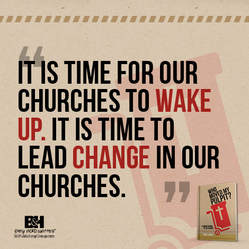 Last Christmas I took my kids to one of those churches hosting a Living Bethlehem. I'd gone to one as a kid in a church gym with some fairly cheap costumes. Not this church. They had whole stables, a blacksmith shop, Roman guards, camels, character actors throughout. Then we go inside for cookies and hot cocoa and their kids area has slides and indoor playgrounds. I texted my wife and went "Their kids area has slides. We'll never leave. Also, do you think we can swing that in our kids space?" Here's the reality: not many of us are serving in churches with the facilities, space, or finances to do something like that. Most of us are in churches with secondhand supplies, donations to keep VBS afloat, a sound system held together with duct tape and prayer, and too few bodies to fill a volunteer list. It's easy to despair. It's easy to look at our situations, compare them with a church with slides, and throw up our hands and say "Well we might as well close up, we can't compete with them!" That's where God wants us to be scrappy. I'm incredibly indebted to Thom Rainer and his team for putting together and releasing the book Scrappy Church. The premise is simple: you don't need what they have to reach your community. You have everything you need, you just need to be scrappy. Scrappy churches look at opportunities over obstacles - Your church may not have a sprawling multi-acre facility, but you might have a parking lot. And you might have a neighborhood around you. Those are opportunities. You have meeting space? Use it. Invite neighborhood groups, host picnics, reach out to your community. Scrappy churches get creative - I remember one time seeing a megachurch budget and their landscaping costs were more than our entire operating costs. Guess we won't get slides. But what we don't have in the bank isn't stopping us from ministry. Get creative. I'm pumped about an opportunity we had presented to us, for small groups to use water bottles, cookies, flashlights, and other hands-on opportunities to serve businesses and families in our area. Best part? It costs us nothing. Small groups take ownership. That's creative! Scrappy churches stop making excuses - If you talk to declining or plateaued churches and ask why they're not growing, odds are you'll hear a lot of excuses. "Well the megachurch planted a campus next to us," "Young families don't care about church like they used to," "Our music isn't cutting edge enough (or it's not old fashioned enough)," and the list goes on and on. Scrappy churches don't make excuses for why people don't come or why they're not growing. Instead, they get to work. They do what Rainer calls the Outreach Deluge. They do something. Scrappy churches invest in relationships & groups - Our denomination had a landmark moment this past summer when hard data was presented that showed we had a problem: our front door was huge (we had baptized thousands) but our back door was bigger (we'd not grown in average attendance). When people visit, join, or connect with our churches, we have to do the work of investing in relationships and groups. If you don't have groups, you won't have a net to catch people. That's why every person who joins our church is put in contact with a Sunday School teacher. Groups are free. You just throw some chairs in a room (our class uses a corner in the fellowship hall), invest in some teaching materials you already had, and train a leader. Scrappy churches don't give up - It's easy to throw in the towel when it feels hard. I get it. The other day I had a long sit-down with someone who was an encourager to keep pressing on. I needed it. Scrappy churches don't quit. They keep pushing on. They're not scared of failure. Know what you do when something you try doesn't work? You punt and move on. Too many churches and pastors are so scared of failure they never try anything. Not everything will work. And not everything will work always. But you don't give up. If you've read Scrappy Church, what has it done to bolster your ministry?
1 Comment
 Yesterday we got to host Tommy Green, who is the Executive Director of the Florida Baptist Convention. He brought a strong, timely, and convicting message. And for one of the few times since 2016, I got to sit next to my wife. As pastors, we find our primary identity and responsibility in preaching. It's what the Bible tells us to be our primary focus (Acts 6:4) and the ability to preach well is listed as the only skill qualification for pastoral ministry. So it's kinda a big deal for us. Because of that, we usually don't step out of the pulpit except for vacation time. But we need to bring in the occasional guest speaker. 1. It gives you a break - The weekly grind of ministry often finds its most toil in the preparation of your Sunday message. Some pastors spend as much as 20-25 hours a week just on the Sunday morning message. Others spend less time than that, but consume more mental/emotional/spiritual energy than can be recorded on a time sheet. Bringing in a guest speaker lets you step out of the grind a little bit. On top of that, it lets you have a Sunday where you're not giving your everything in the delivery of your message. So you can engage in worship without the pressure of preaching. 2. It lets you work ahead - When you're not under the gun to finish for Sunday, you can work ahead on your sermon preparation. Not everyone is like this, but I try to stay a few weeks ahead on the process. It works for me. It might not for you. So if it doesn't work for you, use the extra time to develop your next series, your next outline, or to think ahead of future sermon planning. 3. You can focus in other areas - When you don't have the pressing need for a Sunday preparation you can devote a little extra time to pastoral care, to administration, to visiting, to staff development, and other areas you find yourself "not having the time for." 4. Your people get a break - They love you. But they need a break from you. I mean that in the most gracious way. You have a particular style, flow, cadence, and emphasis. Hearing from someone else is good for them. It lets them hear from a different voice. It shows them (and you) that you don't have to be the only spiritual influence in their lives. It's a good thing to get a break. Ask anyone on a diet who's had a strong Cheat Day. 5. You can get fed - Since I became a senior pastor, I've maybe been out of the pulpit 10 times. You may be reading this and not even remembering the last time you were out. Your soul needs to be nourished. And you can have guests come in without you being out on vacation. You can have other godly men called to ministry in your church fill the pulpit for you. You need to be fed. You need to be preached to more than at a conference or podcast.
A few months ago a dear couple in our church took us out for dinner and coffee to talk about something that God had put on their hearts in previous churches - a team of people focused on praying for me as their pastor. I was floored, humbled, and appreciative of it on more levels than I can write about. Since then, I get notes of encouragement, time spent in prayer on Sunday mornings, and a number of people in our church are getting weekly updates about what they can pray for.
To say the least, it's been powerful. It's why when I saw this video I was so grateful and glad for people like Jim & Jean who love their church and love their pastor.
If you're reading this and you're a pastor, chances are you're tired. Chances are you're stressed. Chances are you're frustrated. Chances are you're running on empty and entering into a weekly survival mode. Very few of us will make it to retirement in ministry. We'll burn out, we'll dry out, we'll be chased out, or most of the time we just give up and walk away.
That's why you need people praying for you. Too often church prayer lists and church prayer ministries end up being sick lists. There's a time and a place for sick lists and physical needs. But you as a pastor need people committed to praying for you, with you, and beside you. The weights of ministry are too much if you're trying to do it alone. You need prayer for physical needs. Satan so often attacks us through our health, because if we're laid up sick or dealing with health issues, we're not able to lead God's people. Have people praying for you from a physical standpoint, your church needs you healthy and strong and refreshed. You need prayer for your family. Ministry can be a heavy burden for a family, especially for a spouse. Get people praying for your home, your marriage, and your kids. You might have kids who haven't made a profession of faith, or who've wandered far from God. Your ability to minister is directly correlated to the health of your home and your family. You need prayer for your soul. Pastors are constantly in "Give" mode, and by the end of the day many times our tanks are empty. We've spent hours or days or weeks pouring into people and our souls are dried up. People who are praying for your soul to be refreshed, for your own walk with the Lord to be strong, for your encouragement are invaluable. You need pray for your leadership. You carry the burden of vision in your church. You stand and preach. You lead the youth ministry. You get up and lead music and worship. It's a lot, whether you're the lead pastor or a second chair. And you need people praying for your leadership, that it's faithful, that you're focused on Christ, and that you're walking in wisdom. If you're interested in learning about a Pastor Prayer Team, shoot me a note. I'll be glad to get you in touch with the couple leading ours. It's been revolutionary.  One of my favorite things in football is a goal line play. Twenty two giants line up and try to push the ball across for a touchdown. It's pure will. Who will get the advantage? And it's even better when a running back keeps churning his legs to get every inch forward. It's also cool when the team runs something like Philly Special and takes everyone off guard. The punch in the end zone is the finish, but certainly not the only part of the drive. Successful drives are often a mix of busted plays, dropped passes, long runs, and piles of dust. Yards are eaten up slowly, with perseverance, and can be maddeningly frustrating for not only players but those watching. Leading in ministry looks like that too. You plow, you dig, you stretch, you push, and it doesn't feel like you're going anywhere. But over the course of a year, decade, and lifetime, you've accomplished something. Everyone loves fast turnaround stories in business or in sports (look at the body count Nick Saban and Urban Meyer have left behind them of coaches who couldn't win as quick as they did). But truthfully, it's a work of endurance. Faithfully leading in the local church, especially in a revitalization effort, is often a series of incremental advances. It's 3 steps forward and 2 steps back. Or to use the football analogy, it's 3 yards and a cloud of dust. The key word is faithful. Our responsibility in leading God's people isn't to be the most clever, most creative, or make the biggest spectacle, it's to be faithful. Preach the Word week in and week out. Don't focus on awkward response times. Your job is to proclaim what God has said and then trust Him with the results. He's working. You just can't see it. Love your people. God has entrusted us as pastors with people who are dear to Him. So dear that Jesus died for them. We can't love them where we want them to be, we have to love them where they are. Even when they disagree with us or criticize us. Even when they're in adult diapers and can't remember us. Even when they make bad choices and shipwreck their families. Love them. Serve well. Endurance means showing up every day and working hard, serving where God has placed you. It means loving your community, wearing out your knees in prayer, and putting in hours no one will ever see or give you credit for. Hang in there pastor. The end zone is there.  Leaders have a responsibility to be change agents, especially in the local church. We cannot simply assume that things will be the same over the years, because it's an impossibility. The way churches operated 15, 20, 30 (even 5) years ago is a model that cannot carry on. The culture around us has changed. We've moved from a place of prominence to a place of general apathy in our communities. We're moving into a sea of a post-Christian worldview. We're moving towards commitment struggles among younger families and away from institutional loyalty. Even the way we communicate with one another has changed radically in the last several years. Change typically falls into one of three areas, and it's important for a leader to recognize not only what kind of change they want to promote, but how it will need to be implemented and how it will be received. That's why the best rule for change is to navigate slowly. Leading change too fast makes it hard to get the onboard support. 1. Systemic Change - This is change to processes and operational issues. In churches this can include things like revising bylaws (which should be reviewed every couple years at a minimum), updating policy, developing an organizational pattern, building structures of accountability for finances, and other more impersonal changes. Leading through these can be difficult because there is often an emotional attachment to the processes people are familiar with. It's always key to lead through systemic changes with a team of people who can present a unified front to a church's leadership team and ultimately to the church body as a whole. 2. Surface Change - These are superficial changes like a fresh coat of paint, a new logo, a website redesign, decorating your children's ministry area, cleaning out junky closets (what's the weirdest thing you've ever found in a church closet?), and replacing worn out furniture. Surface changes can be costly because they're largely replacing material, but it can serve as a jump start towards systemic or cultural change. Many times churches keep things the way they are, even junky closets, because that's all they've known. It's not intentional, they just don't see what could happen if they made some minor adjustments. But surface changes aren't enough. You can't assume new parlor couches will spark revival. That's like hanging a chandelier in a condemned house. Sure it looks nice, but it doesn't fix anything. Surface change can be a "low hanging fruit" to generate short term wins (see Kotter's Leading Change, or Rainer's Who Moved My Pulpit? for more on leading with momentum). 3. Cultural Change - This is the most significant form of change, because it's not just changing appearances or processes, it's changing people. Cultural change happens slowly, over a long term process. Cultural change is becoming outwardly focused, creating a missions culture, repairing broken relationships, redeeming past church fights and splits, fostering a climate of unity, and developing a passion for sending. That doesn't happen overnight. And this is where many pastors throw up their hands in frustration and walk away, and never give cultural change a chance. If you're in a church and wanting to see cultural change take place, you're looking at a minimum of 5-7 years. And unlike a fresh coat of paint or new bylaws, you won't see immediate fruit of cultural change. That's where a leader has to be willing to take the long view, which means not getting bogged down by week-to-week or even year-to-year. You have to look at things from 3 years ago, 5 years ago, to truly see cultural change take place. But pastor, don't lose hope. Your faithfulness in the pulpit, in the hallway, in counseling, and in your community are producing something wonderful. You're stewarding the Kingdom through a local church that Jesus loves. Hang in there. Don't lose hope. I say this as much to myself as to you: God's not finished with you or your church yet.  When I was a kid my dad took the training wheels off my bike, walked alongside me, and then gave me a push and let go. After a few falls and some asphalt scratches, I finally got it. Thirty years later, I can still ride a bike without thinking about it. I just push off and pedal. In fact, I'd bet that almost all of you reading this could get back on a bike and pick it up quickly, no matter how long it's been since you last hopped in the seat. On the other hand, not everyone can pick up skis and go down a mountain. Shoutout to our Florida friends & family to you who haven't ever seen snow! It's a skill that takes practice, takes time, and most important takes access to snow! Leadership is a lot like this as well - We operate in our areas of riding a bike, and other times it feels like we're sliding down a snowy mountain like a 200 pound missile. Some leaders naturally are more comfortable blocking their time, don't have any problem leading a meeting, can pick up any speaking opportunity and not blink. And others of you have to prep yourself before you open your daily calendar. It's harder to plan your time, you get nervous before meetings, you don't feel comfortable in large groups of people. All of us as leaders have our Bike Riding areas, where we can function and thrive without thinking about it. Those are your leadership strengths. You don't need to do anything to grow in those areas, you're really strong already. Other people notice your giftedness in this area too. With your Bike Riding areas, this is what I'd say: 1. Don't let your strengths become an idol - It's so easy for us to find our identity in our strengths instead of the God who we serve and worship. 2. Look for improvement - No matter how strong you are in a certain area, there's always room for growth. Alabama won a football game by 30 points and the coach was preaching improvement. 3. Pass them on - Things you're good at may be areas others are weak at, so try to find ways to encourage others in growing in those areas. If you're a comfortable public speaker but someone on your team isn't, give them coaching from what you do to make it easier. Spend time with people who struggle leading meetings to offer your input. Like with our Bikes, we all have our Skiing areas. These are our weaknesses, the areas where we know we aren't very good and can tell our leadership is weaker because of them. But just like how the only way to get better at skiing is to hit the slopes, the only way to grow in your weaknesses is to work on them. Here's what I'd say about that: 1. Find a mentor - Get help and wisdom from someone better than you in your weaknesses. One of my weaknesses was (and still is sometimes) hospital & nursing home visits. I didn't like them, they made me nervous, I never knew what to do. So I had an older and more gifted pastor take me along and I watched him. It helped tremendously. Find someone better than you, and pay them in coffee to make you a better leader. 2. Get constructive feedback - Constructive feedback is different than criticism, and in many ways constructive feedback will help you recognize weak areas and ways to improve. If your Skiing area is preaching or speaking, have some trusted people give you an evaluation and feedback on your messages. Ask them for genuine suggestions. One of the biggest things to learn as a leader is the people around you want to help you succeed. But that will only happen if you let them. 3. Swallow your pride - Admitting we can't do something is one of the hardest things to do as a leader. For some reason we've bought into a Superman mindset that says we have to do everything and be good at it if we're going to be good leaders. But swallowing our pride means we're putting away our perception of ourselves to deal with the reality. And the sooner we swallow our pride, the sooner we're moldable into the leaders God wants us to be. How have you shored up and strengthened your Skiing areas in your leadership?  Earlier today I asked for people in the service industry to share their horror stories of "Christians behaving badly," who might have left a tract instead of a tip, or who showed a bad side to the watching world. The responses were quite surprising. One person shared watching a friend throw a Whopper at Burger King because it had onions, after leaving Bible Study. Another that everyone in their restaurant hated working Sunday lunch. One person was yelled at in a drive through. And the best/worst was someone being told to "make the snow disappear, and I hope someone is praying for you because I'm sure not!" When I worked for a large Seattle-based coffee chain, we were yelled at for not saying "Merry Christmas" and for our cups not featuring baby Jesus. One time I was told by a colleague "That's how you say Happy Birthday to Jesus, yell at people. Nice." At a huge pastor's conference, the organizer got up on stage and told the crowd of thousands "We are so glad that you are here. But the servers and baristas in this town hate you because of how cheap you are. Fix that. Today." Not all Christians are bad tippers or bad customers. But when we hear these stories, we cringe because of what we know Jesus had to say about his followers. In Matthew 5 we're called "salt of the earth" and "light of the world." We're uniquely placed in the world to bless it, to bring good, to shine light in the darkness. And all our good works, our kindness, our generosity, and our love is done so that "they will see your good deeds and praise your Father in heaven." (Matthew 5:16) Did you ever think about that for a minute? That the way you interact with other people can be a springboard to their faith, to their worship of Jesus? That's powerful. To that end, let me challenge us as pastors: teach and model what it means to be the picture of kindness to others. That includes being on a support call when you've been on hold an hour. Or when your coffee order gets messed up (I had a pastor's wife once snap back at me for messing up her coffee, good times). Or when your steak is medium instead of medium rare. Why pursue the picture of kindness? Because the way we act can point people to Jesus. You'd be surprised how far a little kindness goes. We've been fortunate over the years to have incredible conversations with servers and others we've encountered just by being kind to them. Whenever we go out to eat, our goal is to best reflect Jesus in the way we interact with others. Sure we ask for extra napkins or refills or have a ton of questions because we have picky kids. But our goal is to be kind in everything we do. How can you as a pastor encourage your church to kindness as a springboard for Gospel witness? Let me propose 4 ways. 1. With a tract, leave a (bigger) tip - Servers will tell you how many times they've been stiffed for a tip so they could get a Gospel tract. I encourage you to leave them. Leave a contact card for your church and a note inviting the server to worship. But pair that with a generous tip. For us, 18% is the starting point (it's easy math, triple the tax minus a dollar). 2. Offer to pray - It's a non-confrontational question. When you leave your barber or your coffee place, ask if there's anything you can pray for. In almost every instance, you'll get something. Not only have you been kind, you've ministered. That also means follow up. Talk to them next time you come in, ask how <whatever it was you prayed about> is going. 3. Be patient - A lot of times after church it's second nature to want to grab lunch. Guess what, you and a lot of other people had the same idea! Patience is important so you don't compromise your witness. When the restaurant or salon or coffee shop is slammed, patience is what can open a Gospel door for you. 4. Pray for and Expect open doors - Whenever we pray for times to have Gospel conversations, we need to meet that with an expectation they will actually happen. This is where we have to be aware of what's going on around us--passing comments, body language, the wear of stress in someone's eyes. When we're seeking open doors for Gospel conversations, we should recognize them when they drop in our lap. That only happens when we actually expect them to! What do you do to help bear witness to your faith in Christ with others, especially in the retail & customer service world? This morning I got to spend some time with a British pastor with a burden to encourage pastors and recapture a true New Testament church, one healthy and strong that sees missional impact in its communities. Besides the fact I can listen to a Brit read the phone book, I was captivated by his passion for churches to more than simply exist. He told about a church he pastored that was dead in the water but started to see "those people" from the community come to faith and it transformed the way they did church. It all hit when, during a meeting with the deacons, one stood up and said "You're wrecking our church! We don't sing the way we used to, we don't do things like we did before, and the people here aren't like the ones who'd been here before."
Good. I'm glad that church was wrecked. For one, they thought it was theirs. It's not. It's God's. And God's going to take what's His and do wonders with it. Whenever any of us think we have ownership over the church, or if someone thinks they can dictate what a church does because they have the loudest mouth or the biggest bank account, that's a church that deserves to be wrecked. All of us who serve in ministry do so as stewards and shepherds, not owners. Second, I'm glad it was wrecked because the people joining had been truly transformed by the Gospel and weren't just going through the motions. How many times do we look out every week and see people casually go through the motions of worship without realizing they've been changed by the greatest news ever? When did we settle for this as normal for the Christian life? Third, I'm glad it was wrecked because it's only when Jesus wrecks a church can they truly step out in faith and trust Him. Mark Twain once said that church is where "good people go to be told by good people that they're good people." Unfortunately, for most churches, that's all it becomes: a weekly pep talk so we can feel better about ourselves. But when Jesus wrecks a church, that's when we have no other choice but to trust Him. And that's a wonderful place to be. Fourth, I'm glad it was wrecked because then the leadership and pastors aren't wasting their calling. Far too many pastors are called by God, equipped by God, and find themselves in churches that waste their calling. Instead of leadership, vision, preaching, and mission, the church wants a gardener who will keep things nice and pretty until everyone's dead. Let's pray that the churches we lead get wrecked. |
Scott M. DouglasA blog about leadership and the lasting legacy of family ministry. Archives
August 2023
Categories
All
|
 RSS Feed
RSS Feed



